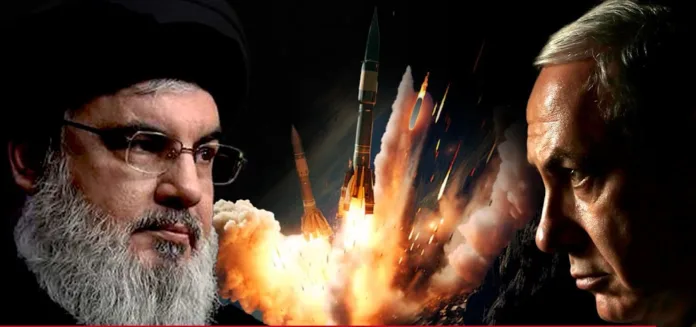In a significant escalation, Hezbollah’s missile attack on central Israel triggers a swift response from the IDF, with no reported casualties
On September 25, 2024, Hezbollah marked a historic escalation in the ongoing conflict by launching its first missile toward Tel Aviv. The missile, reportedly aimed at the Glilot military intelligence compound, triggered alarms in several Israeli cities, including Tel Aviv and Netanya. Fortunately, Israel’s advanced David’s Sling air defence system successfully intercepted the missile, ensuring no damage or casualties were reported.
The tension in the region escalated significantly in the days leading up to this incident. Israeli airstrikes in southern Lebanon resulted in six fatalities, including a Hezbollah missile unit commander, Ibrahim Qubaisi. These strikes came amid heightened hostilities, with reports indicating over 300 rockets launched from Lebanon, marking one of the most intense days of conflict since the war began.
The Israeli Defense Forces (IDF) confirmed the successful interception and noted that sirens had been activated in multiple locations due to potential fragments from the intercepted missile. Despite the escalation, the IDF stated that there would be no changes to the guidelines for Israeli citizens, and educational activities would continue as planned in central Israel.
Prime Minister Benjamin Netanyahu is scheduled to address the United Nations General Assembly on Thursday, amidst calls for de-escalation from the international community. U.S. President Joe Biden also urged an end to hostilities in Gaza while emphasizing the need for restraint between Hezbollah and Israel.
Hezbollah’s missile launch represents a significant shift in the dynamics of the conflict, as it signifies the group’s willingness to escalate its military capabilities against Israel. The implications of this development resonate beyond the immediate military landscape, raising concerns about the potential for a broader regional conflict involving Iran, which supports Hezbollah.
Analysis:
Political: Hezbollah’s missile launch and the IDF’s response highlight the complex political landscape in the Middle East. This escalation not only affects Israeli-Lebanese relations but also complicates the efforts of international mediators trying to stabilize the region. Netanyahu’s upcoming address at the UN will likely focus on Israel’s security needs while framing Hezbollah as a significant threat. The incident may also influence political narratives in Israel, pushing for a stronger military response and potentially shifting public opinion in favor of heightened military action.
Social: The societal implications of this missile launch resonate deeply within Israeli communities, as fears of war intensify. Citizens living in the affected areas may experience increased anxiety and uncertainty about their safety. Additionally, this event could exacerbate social divides within Israel regarding military strategy and the ongoing conflict with Hezbollah. The psychological impact on families, especially those living near the borders, underscores the need for mental health support in times of conflict.
Racia: The broader regional tensions also evoke discussions about ethnic and national identities. The Israeli-Palestinian conflict and the involvement of Hezbollah have racial and ethnic dimensions, influencing how communities perceive one another. This missile launch could further entrench divisions, impacting not only Israeli Jews and Palestinians but also Lebanese citizens who may feel the repercussions of increased military actions.
Gender: In conflict scenarios, women and children often bear the brunt of violence and insecurity. As tensions escalate, vulnerable populations face heightened risks, including displacement and trauma. The Israeli government’s response to such conflicts should prioritize the protection of women and children, addressing their unique needs during military escalations. The social dynamics within families may also shift, with traditional gender roles challenged as women take on increased responsibilities in times of crisis.
Economic: The conflict’s continuation and escalation have significant economic implications for both Israel and Lebanon. In Israel, ongoing military actions can lead to increased defence spending, impacting national budgets and economic growth. For Lebanon, the ramifications of sustained military action could exacerbate the country’s already dire economic situation, potentially leading to a humanitarian crisis. The international community must recognize these economic dimensions when addressing the conflict, as they influence the long-term stability of the region.
